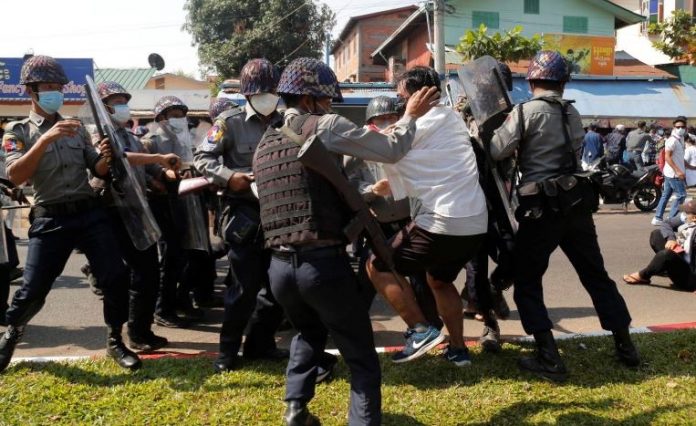The top United Nations human rights body has called on Myanmar to release Aung San Suu Kyi and other officials and to refrain from using violence on people protesting against the military coup.
The 47-member Geneva forum adopted a resolution brought by Britain and the European Union (EU) unanimously without a vote, although Russia and China said afterwards that they “disassociated” themselves from the consensus.
Myanmar’s envoy said before the vote that the resolution was “not acceptable”.
The resolution was adopted after the UN human rights investigator for Myanmar urged the UN Security Council to consider imposing punitive sanctions, arms embargoes and travel bans in response to the coup.
The United States, which imposed its own sanctions on Thursday, urged other UN member states to follow suit, in its first remarks to the Human Rights Council since returning to the forum this week.
Special rapporteur Thomas Andrews said there were “growing reports and photographic evidence” that Myanmar security forces had used live ammunition against protesters since seizing power almost two weeks ago.
“Security Council resolutions dealing with similar situations have mandated sanctions, arms embargoes, and travel bans, and calling for judicial action at the International Criminal Court or ad hoc tribunals,” he told the council.
“All of these options should be on the table.”
The 47-member forum met at the request of Britain and the European Union to consider a resolution calling for the release of ousted Myanmar leader Suu Kyi, and for UN monitors to be allowed to visit. It was adopted unanimously, although Myanmar, Russia and China envoys said they “disassociated” themselves from the resolution.
“With this resolution we would like to send a strong signal to the people of Myanmar: the protection of their human rights matters to us,” said Austrian Ambassador Elisabeth Tichy-Fisslberger on behalf of the EU.
However, the resolution’s language had been watered down somewhat in an apparent bid to get detractors on board.
In a letter read out to the Council earlier on Friday, some 300 elected parliamentarians called for UN investigations into the “gross human rights violations” that they said the military had committed since its coup, including arrests.
‘Draconian orders’
Supporters of Aung San Suu Kyi clashed with police on Friday as hundreds of thousands joined pro-democracy demonstrations across Myanmar in defiance of the military’s call to halt mass gatherings.
The UN’s deputy rights chief Nada al-Nashif decried the detention of the country’s elected civilian leaders, including Aung San Suu Kyi and President Win Myint, and of more than 350 others, including officials, activists, journalists, monks and students.
UN officials and diplomats alike voiced alarm at the assault on democracy in the country and violence against protesters.
“The world is watching,” al-Nashif said. “Let us be clear: the indiscriminate use of lethal or less-than-lethal weapons against peaceful protesters is unacceptable.”
In addition, she lamented, “draconian orders have been issued this week to prevent peaceful assembly and free expression”.
Min Aung Hlaing, the head of Myanmar’s army, known as Tatmadaw, has justified his coup by alleging widespread voter fraud during November’s election.
Myanmar ambassador to the UN in Geneva Myint Thu said Myanmar would continue to cooperate with the United Nations and uphold international human rights treaties, adding: “We do not want to stall the nascent democratic transition in the country.”
The United States, which only re-engaged with the council this week after former president Donald Trump withdrew in 2018, also harshly condemned the coup.
US diplomat Mark Cassayre said all those “unjustly detained” should be released, and called for “accountability for those responsible for the coup, including through targeted sanctions”.
US President Joe Biden announced this week that his administration was cutting off the military’s access to $1bn in funds, with sanctions targeting Min Aung Hlaing and other top generals.
Source: Aljazeera/Agencies
















